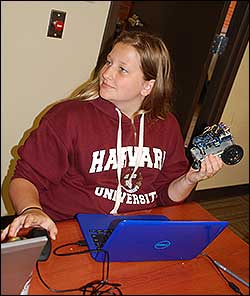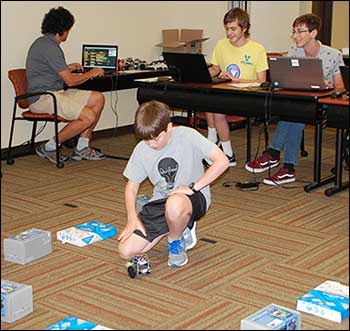In this tug-of-war game there was no rope and no pulling. Groans, however, were plentiful as pairs of middle and high school campers at Vanderbilt jabbed at computer keys and space bars to push left or right a small robot car with cartoon googly eyes. One person in each pair was going to win.
At midweek, campers with little or no knowledge of computer programming have learned control structures, variables, data types and functions. They can write scripts and drive – by keyboard – robot cars.
By Wednesday, they have written a self-driving program and it’s time to ‘escape’ and ‘attack’ – tug of war. That day they learn about cyber security of cars, some of the known vulnerabilities and attacks in the context of modern cars. Later, cyber security of GPS satellites and receivers and of unmanned aerial vehicles are topics.
As the weeklong camp nears its end, they will learn how to encrypt all messages. Nevertheless, even with safely encrypted messages, replay attacks can still play havoc.

“So far, the most fun has been programming the robots,” said Madelyn Sheehy, a Mount Juliet middle school student. Sheehy is one of 13 students – ages 12 to 17 – attending the Cyber-Physical Systems Security Summer Camp ’18 at Vanderbilt University’s Institute for Software Integrated Systems. This is the second summer for CPS camps. ISIS offered two camps in June and camp partners are the U.S. Air Force Research Lab, the National Security Agency and the National Science Foundation.
The camps are a free-of-charge, five-day experience for highly qualified local students interested in the growing field of CPS security. A teacher from each school is invited to attend and among the goals are to increase diversity and interest in cyber-physical systems and to help teachers develop CPS curricular content. This is the second summer for CPS camps and ISIS plans to offer them again in 2019.
Campers learn to program RoboScape robots using NetsBlox, a visual programming environment created by Professor of Computer Engineering Akos Ledeczi and his team. The team has worked with students as young as middle schoolers and the June camps are another opportunity to work with young learners. NetsBlox introduces programming basics and a high-level view of distributed computing.

“If you consider the popularity of Netflix, Facebook, YouTube, Twitter, Google Maps, Siri, Amazon Echo, all distributed programs, distributed programming is rapidly becoming part of basic computer literacy, so NetsBlox presents a unique opportunity, because students already use this technology every day and their natural curiosity will motivate them to learn more about it,” Ledeczi said. “We believe that NetsBlox will provide increased motivation to students to become creators and not just consumers of technology.”
In addition to Ledeczi, Professor of Computer Science and Computer Engineering Xenofon Koutsoukos; Miklos Maroti, research associate professor of computer science; and Brian Broll, research scientist, served as camp faculty.
Contact: Brenda Ellis, (615) 343-6314
Brenda.Ellis@Vanderbilt.edu